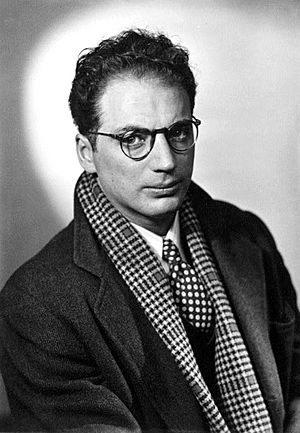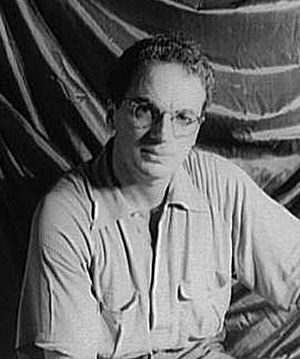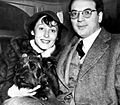Clifford Odets facts for kids
Quick facts for kids
Clifford Odets
|
|
|---|---|

Odets in 1938
|
|
| Born | July 18, 1906 Philadelphia, Pennsylvania, U.S.
|
| Died | August 14, 1963 (aged 57) Los Angeles, California, U.S.
|
| Resting place | Forest Lawn Memorial Park, Glendale |
| Occupation |
|
| Years active | 1925–1963 |
| Spouse(s) | |
| Children | 2, including Walt Odets |
Clifford Odets (born July 18, 1906 – died August 14, 1963) was an American writer for plays, movies, and a stage actor. In the mid-1930s, many thought he would become as famous as Nobel Prize winner Eugene O'Neill. O'Neill was starting to step back from the busy world of Broadway.
Odets's plays were very important, especially during the Great Depression. They talked about social issues. His work inspired many famous playwrights who came after him, like Arthur Miller and Neil Simon. After 1941, Odets mostly worked on movies in Hollywood. He later returned to New York and wrote more plays.
Contents
Early Life and Beginnings
Growing Up and First Steps
Clifford Odets was born in Philadelphia. His parents, Louis J. Odets and Pearl Geisinger, were immigrants from Russia and Romania. He grew up in Philadelphia and the Bronx, New York. He left high school after two years to follow his dream of becoming an actor and writer.
Becoming an Actor
Odets loved acting and was very creative. At 19, he started performing on his own, calling himself "The Rover Reciter." He joined talent shows and got jobs reading on the radio. He also acted in plays with Harry Kemp's Poet's Theatre. Odets was one of America's first disc jockeys, playing music and talking on radio stations in Manhattan. He also reviewed plays, which let him see many shows for free. He was greatly inspired by the play Juno and the Paycock by Seán O'Casey.
Career in Theatre
Joining the Group Theatre
Odets spent several summers teaching drama at camps. He also toured with acting companies, playing many different characters. His first big chance on Broadway came in 1929. He got small roles and was a backup actor for Spencer Tracy. Later, he joined the famous Theatre Guild as an extra.
At the Theatre Guild, he met Cheryl Crawford, who suggested he meet Harold Clurman and Lee Strasberg. They were starting a new theater group. Odets was fascinated by their ideas about acting as an art. He became one of the first members of the Group Theatre in 1931.
The Group Theatre's Influence
The Group Theatre became one of the most important acting companies in American history. It was the first to use a new acting method in the U.S. This method was created by Russian actor Constantin Stanislavski. It was further developed by Group Theatre director Lee Strasberg and became known as Method Acting.
Odets often had small roles in the Group Theatre. He learned a lot about writing plays by watching from backstage. He said that the Group Theatre's acting style greatly influenced his plays.
Becoming a Playwright
Odets started writing plays at the urging of Harold Clurman. His first plays were about his own life and about Beethoven, but Clurman encouraged him to write about things he knew well. In 1932, Odets began writing a play about a Jewish family in the Bronx. This play was later named Awake and Sing!.
His first play to be performed was Waiting for Lefty, a one-act play. It opened on January 6, 1935. This play was inspired by a taxi strike in New York City in 1934. It showed the struggles of workers during the Great Depression. The play ended with a call for the taxi drivers' union to strike, which made the audience stand up and cheer. Waiting for Lefty's huge success made Odets famous around the world. However, its strong pro-union message caused it to be banned in many places.
Awake and Sing! was finally produced by the Group Theatre in February 1935. Many people consider it Odets's best work. It was one of the first plays on Broadway to focus entirely on a Jewish family. It tells the story of the Berger family trying to keep their dignity during tough economic times.
Odets became the main playwright for the Group Theatre. His plays often showed the human spirit trying to succeed against challenges. His play Golden Boy (1937) was a big success for the Group Theatre. It was about a young man who had to choose between his artistic dreams and wanting money.
Later plays like Rocket to the Moon (1938) explored how people sometimes fail to reach their full potential. While some critics wanted him to write more political plays, Rocket to the Moon still made him famous enough to be on the cover of Time magazine.
Hollywood Career
Writing for Films
The success of Odets's plays quickly caught the eye of Hollywood producers. He first went to Hollywood in 1936 to write for movies. He wanted to earn money to help the Group Theatre and himself. His first movie script was for The General Died at Dawn (1936).
Like most screenwriters back then, Odets worked for big movie studios. He often wrote early versions of scripts for films like Rhapsody in Blue and It's a Wonderful Life. Other writers would then finish them. Odets didn't always take credit for his work. But he did get full credit as both writer and director for None but the Lonely Heart (1944). This movie starred Cary Grant and Ethel Barrymore, who won an Oscar.
Odets also wrote the screenplay for Sweet Smell of Success (1957). This movie showed the dark side of the newspaper world. He also directed The Story on Page One (1959), for which he wrote the script.
Several of Odets's plays were made into movies, even though he didn't write the movie scripts himself. These include Golden Boy and The Country Girl.
Writing Style
Odets's plays are known for their unique language. He used a poetic, street-smart way of talking. Arthur Miller said that Odets's language made him a one-of-a-kind playwright in America. His style was influenced by Seán O'Casey, another writer who cared about working-class people. Odets also often put his audience right into the middle of the story. He focused more on the characters than on the plot, similar to the writer Anton Chekhov.
Government Investigations
In the 1950s, a government committee called the House Committee on Un-American Activities (HUAC) investigated Hollywood. They were looking into possible communist influences. Odets was asked to testify in 1952. He had been a member of the Communist Party for a short time years before. He answered their questions. After his testimony, it became harder for him to get movie jobs. He felt confused by the negative reactions to his testimony. His writing slowed down after this event.
Later Years and Legacy
Final Works
In the early 1960s, Odets agreed to write for a new TV show called The Richard Boone Show. He also helped supervise the scripts. Two of his finished TV scripts were shown after he passed away. Odets also worked on a musical version of his play Golden Boy. He died before it was finished.
Lasting Impact
Many people thought Odets didn't achieve all he could have because he spent so much time in Hollywood. However, his friend Elia Kazan disagreed. Kazan said Odets planned to return to New York and write his best plays ever.
Clifford Odets is still seen as one of America's most important playwrights. Arthur Miller said that people eagerly awaited Odets's plays, as if they would help everyone understand themselves better.
His play Golden Boy was made into a movie and a musical. The Flowering Peach also became a musical. His movie script for Sweet Smell of Success was turned into a musical in 2002.
In 2006, Lincoln Center celebrated 100 years since Odets's birth with a new production of Awake and Sing!. This play won a Tony Award and brought new interest to his work. Many of his early plays have been performed again, especially after the economic challenges of 2008.
Odets's life and work have also inspired other movies and plays. The film Barton Fink (1990) has characters and details inspired by Odets. He is also a character in the play Names, which is about actors during the time of the Hollywood investigations.
Many books have been written about Clifford Odets and his impact on American theatre. He was also named a member of the American Theater Hall of Fame.
Stage Works
As an Actor
- Midnight (1930)
- Night Over Taos (1931)
- 1931– (1931)
- Big Night (1933)
- They All Come to Moscow (1933)
- Men in White (1933)
- Gold Eagle Guy (1934)
- Waiting for Lefty (1935)
As a Playwright
- Waiting for Lefty (1935)
- Awake and Sing! (1935)
- Till the Day I Die (1935)
- Paradise Lost (1935)
- I Can't Sleep (1935, a monologue)
- Sarah Bernhardt (1936, a radio play)
- The Silent Partner (1936, never produced)
- Golden Boy (1937)
- Rocket to the Moon (1938)
- Night Music (1940)
- Clash by Night (1941)
- The Russian People (1942, an adaptation)
- The Big Knife (1949)
- Golden Boy (1950)
- The Country Girl (1950)
- The Flowering Peach (1954)
As a Director
- The Country Girl (1950, original Broadway show)
- Golden Boy (1952, a new production)
- The Flowering Peach (1954, original Broadway show)
Filmography
As a Screenwriter
- The General Died at Dawn (1936)
- None but the Lonely Heart (1944)
- Humoresque (1946, adapted screenplay)
- Notorious (1946, uncredited dialogue for love scenes)
- Deadline at Dawn (1946)
- Sweet Smell of Success (1957)
- The Story on Page One (1959)
- Wild in the Country (1961)
As a Director
- None but the Lonely Heart (1944)
- The Story on Page One (1959)
As an Actor
- The General Died at Dawn (1936) – a small, uncredited role
- Sweet Smell of Success (1957) – a man outside a theatre (uncredited, his last film role)
Personal Life
Odets married actress Luise Rainer in January 1937. She won two Academy Awards for Best Actress. They divorced in 1940. He then married actress Bette Grayson in 1943. They had two children, Nora (born 1945) and Walt (born 1947). Odets and Grayson divorced in 1951. Nora Odets passed away in 2008. Walt Odets became a psychologist, author, and photographer.
Odets also had relationships with other actresses like Frances Farmer and Kim Stanley.
Death
Clifford Odets had stomach problems for a long time. On July 23, 1963, he went to the hospital for stomach ulcers. During surgery, doctors found he had stomach cancer that had spread. Many of his friends from movies and theatre visited him, including Marlon Brando and Elia Kazan. On August 14, 1963, Odets died from stomach cancer at the age of 57.
His ashes were buried in the Forest Lawn Memorial Park, Glendale in Glendale, California.
Images for kids
See also
 In Spanish: Clifford Odets para niños
In Spanish: Clifford Odets para niños
- List of Jewish American playwrights
 | Ernest Everett Just |
 | Mary Jackson |
 | Emmett Chappelle |
 | Marie Maynard Daly |



